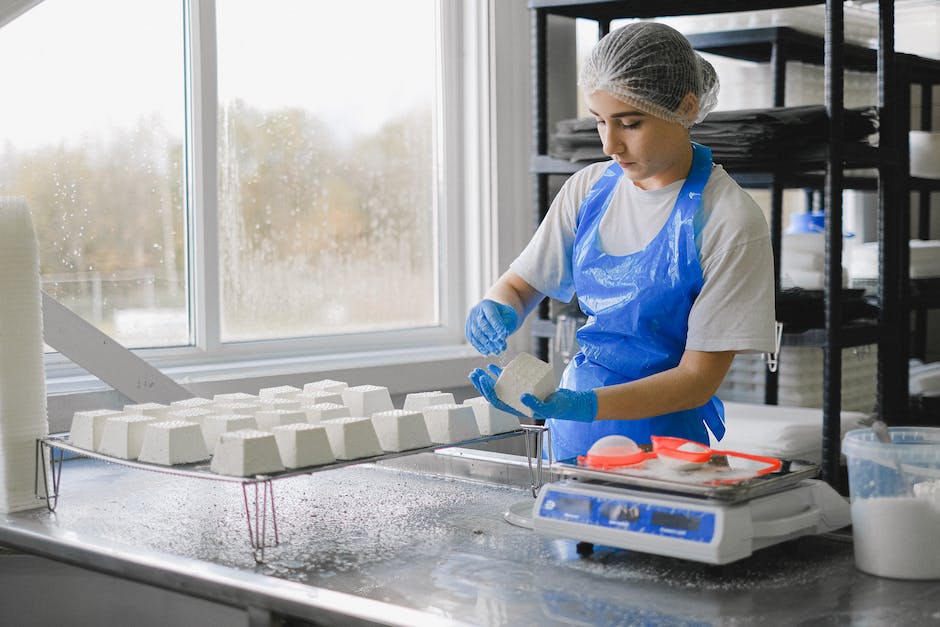

Agridisk
Egypt - Alexandria
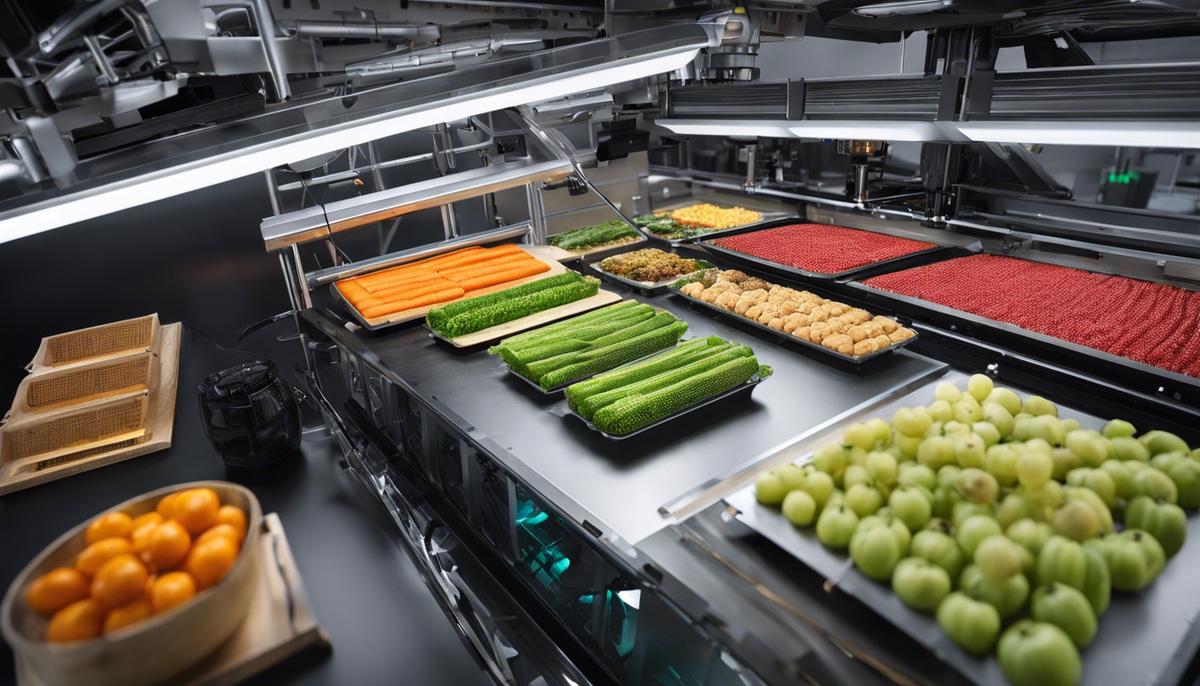
Food industry trends 2023 | What is the future of food industry?
Description: As we continue to navigate our way into 2023, one area that is constantly evolving and simultaneously shaping our lives profoundly is the food industry. This transformation is derived from several fronts, a mix of technological advancements, ecological concerns, shifting consumer tendencies, and an evolving regulatory landscape. Topics such as tech-empowered supply chains, sustainable farming practices, the rise of plant-based foods, health and wellness-driven consumer choices, and changing industry-focused policies shape this transition. This document provides an elaborate discussion on these vital trends and how their interplay symbolises the future of the food industry. Engineered to peck your curiosity, the exploration of how technology is revolutionizing the food industry in 2023 strikes at the very heart of the entrepreneurial spirit. We are witnessing a moment in history where global forces have aligned to transform the way we see, experience, and interact with food, painting a canvas of limitless innovation. Think about AI and food. Not only are we seeing much improved supply chain management spurring productivity, but we've also noted a widespread embrace of AI-powered robots in food preparation. From finely diced vegetables to intricate sushi rolls, culinary bots have shown prowess, delivering precision at a speed unprecedented. Is this just a tinsel of flair and novelty? Hardly. It's a solution to address crippling labor shortages, and perhaps, a stepping stone into a future where workplaces are inclusive of both humans and robots. Next, we step into the realm of food delivery. Picture drones whizzing across cityscapes, dropping off steamy, ready-to-eat meals at your doorstep. As obtuse as that may have seemed a couple of years back, the reality is here. Companies like Doordash and Uber Eats have embraced drone deliveries to amp up efficiency and cut costs, effectively transforming the customary dinner-table chatter. Let's also take a moment to size up the impressive strides in the field of precision agriculture. With IoT flipping the game, traditional farming is being shed for a high-tech approach. Satellite imagery combined with AI has enabled an analytical lookout that results in higher yields, more effective pest management, and efficient irrigation. Blockchain to the rescue? Why not! The transparency of blockchain tech elevates validation, traceability, and food safety to higher grounds, proving to be an efficacious solution for food fraud. The gastronomic world is experiencing a blend of culinary art with functional design in the form of 3D Food Printing. A meal customized to your nutritional needs and aesthetics - a far-flung reality? No more. Embrace this piece of technology that's offering a radical shift in food production and consumption, stirring a revolution in dietary practices. Lastly, gaze upon a burgeoning trend – lab-grown meat. Bringing a sustainable and ethical alternative, this technology could possibly reshape the future of livestock farming. Yes, the taste, texture, and nutritional value are akin to farmed meat, lending validity to the entire endeavor. Taking stock of the above, it’s unequivocal that the infusion of technology in the food industry is not just revolutionizing but profoundly shape-shifting its dynamics. Entrepreneurs across the globe, attention! It’s time to cook up innovation using a liberal dose of tech, stirring new business trends, whetting consumer appetites and carving a profitable niche in an industry that's brimming with opportunities. Spread your wings and let the perceivable universe of food tech take you under its aegis. The intersection of tech and food has never looked this appetizing. Bon appetit! With an ever-evolving business landscape and a rising tide of consciousness among consumers, sustainability is fast becoming the keyingredient in the food industry's recipe for success in 2023. This new commitment to environmental stewardship is not merely a trend, but rather a paradigm shift happening on a global scale. One transformative development gaining traction is the utilization of vertical farming in urban areas. This cutting-edge method drastically reduces the amount of land and water needed to grow crops, slashing logistics costs by keeping the process local. From a commercial skyscraper in New York to a warehouse in Tokyo, it's certain we'll see more of these leafy, high-tech structures sprouting in city centres around the world. Linked to this approach, the growth of aquaponics and hydroponics has a sweeping array of benefits. These soil-less techniques eliminate the need for chemical fertilizers, reduce water consumption by as much as 90%, and promise rapid growth cycles. As urban environments continue to burgeon, turning to these high-yield methods to maximize space seems an opportunity poised for significant growth. Next, the proliferation of plant-based and vegan diets has significantly impacted the industry. No longer perceived as a niche lifestyle choice, an increasing number of consumers are leaning towards plant-based foods, from monastery-style tofu to revolutionary soy protein isolates. This sea-change underlines an ever more widespread acknowledgement of the environmental toll wrought by meat and dairy consumption. Algae-based food is also on the horizon as an innovative answer to food sustainability. High in protein, brimming with essential nutrients, and capable of growing in a variety of conditions, the prospect of integrating algae into our diets isn't as far-fetched as it may seem. Some major food corporations have started experimenting with algae as a base to curb the environmental pressure of conventional farming. Lastly, selling expired but edible food at discounted prices is becoming the new norm in the industry. This initiative helps to tackle two significant global issues: food wastage and hunger. Grocery chains and restaurants are attracting a cohort of budget- and environmentally-conscious consumers with this practice, while curbing the colossal impact of food waste. The exploration of alternative proteins, efficient farming methods, and tackling food waste are just some of the sustainability trends shaping the food industry as we know it. Underneath these initiatives, one also senses a change in the collective consumer consciousness, demanding a concerted, industry-wide response. Thus, businesses that recognize and adapt to these trends stand to be the leaders of tomorrow's market, satisfying customers' appetites, not only for good food but for sustainable solutions. Stepping into 2023, the food industry finds itself in an exciting phase of transformation, driven by evolving consumer behaviors. As individuals become increasingly aware and mindful of what they consume and its impact on the world, new trends are emerging that offer innovative solutions to societal challenges while meeting market needs. Undeniable is the rise in conscious consumerism. Today’s consumers are taking a keen interest in the entire lifecycle of their food - from seed to plate. It’s the era of the informed, concerned customer who demands to know the sources of their food, its journey to their plate, and its ecological footprint. This trend amplifies the need for transparency, necessitating businesses to adopt more proactive, open and honest approaches to satisfy this emergent demand. Home farming kits have burst onto the scene, enabling consumers to overcome supply chain difficulties by taking matters into their own hands. With the integration of tech and nature, consumers can now grow their own herbs and vegetables from the comfort of their homes. Businesses tapping into this trend are reaping robust returns! In the culinary world, innovation is turning heads. Gastronomical experiments keep audiences intrigued - think molecular gastronomy with numerous possibilities; edible packaging reducing waste produced by unnecessary plastic. Not too far in the future, we can envisage a world where meal kits arrive with their cooking instructions printed using edible ink! A core aspect of eco-conscious consumer behavior is the drive towards zero waste, which has produced innovative business concepts. Apps coordinated with local restaurants and retailers prevent food wastage by connecting consumers with delicious, unsold meals that would otherwise be discarded. It's a win-win situation: businesses recover costs, consumers enjoy discounted prices, and the planet benefits from reduced waste. Ghost kitchens – commercial cooking spaces rented by chefs and food entrepreneurs lacking a brick-and-mortar presence - are experiencing massive growth. With the ongoing surge of food delivery platforms and the altered dining behaviors due to recent events, it's a model that offers flexibility in menu options, lower overheads, and an emphasis on quality and quantity. The restaurant industry is also experiencing the concept of 'Restaurants as a Service'. It's an innovation where culinary spaces are rented out during off-peak hours to other chefs or catering companies. This not only maximizes the use of resources but also provides opportunities for culinary start-ups and additional revenue streams for the regular operators. 2023 indeed promises a food industry that continually pushes boundaries, pivots and adapts to cater to the changing preferences and needs of consumers. From home farming kits to ghost kitchens, it's clear that the future is taking shape outside the traditional confines. This evolution showcases the tremendous capacity of the industry to innovate and cater to the varying needs of consumers – a journey that's as fascinating as inspiring, shaping our future food scenes. In the constantly evolving landscape of the food industry, staying afloat requires keeping a finger on the pulse of impending policy and regulatory changes. As we inch closer to 2023, there are several key trends in the pipeline that have the potential to redefine the contours of the food industry. First up, expect more stringent food labeling laws. With increasing demand from consumers for ingredient transparency, regulators are likely to respond by enforcing stricter labeling guidelines. This includes comprehensive disclosure of allergens, GMO content, nutritional information, and origin of ingredients - all aimed at rebuilding shaken consumer trust and fostering food justice for all. Secondly, food safety regulations will likely see an overhaul, especially in light of emerging technologies. With climate change becoming more evident, future regulations may incorporate guidelines for ensuring resilience in food production against harsh environmental conditions. The focus is shifting from simply reacting to foodborne disease outbreaks, towards prevention and increased involvement of businesses in developing a robust food safety culture. With the explosion of food e-commerce, regulators will shift gears to adapt to this digital transformation. Online platforms, home food businesses, and food delivery services will likely face new norms around licensing, hygiene standards, and workforce rights. Water usage policy in the food industry is another key area expected to take center stage in 2023. Regulators may impose stricter standards and incentives to encourage sustainable water use, promoting methods like water recycling and precision irrigation. Finally, the growth of genetically engineered products and novel food technologies such as gene editing and nanotechnology are prompts for a regulatory revamp. Policy modification would center on stringent safety assessments, ethical considerations, and promotion of innovation, potentially making it a complex balancing act between caution and progress. While these policy and regulatory changes might present hurdles in the short term for some, they ultimately lead to the creation of a more transparent, safe, and sustainable food industry - one that aligns with the evolving consumer mindset. For sharp-eyed entrepreneurs and leaders, these changes are not mere challenges, but opportunities ripe for innovation. Seize them and let's shape a revolutionary food industry together, tomorrow starting today. To sum up, 2023's food industry landscape is reimagined with aspects that underline the value of technological progression, sustainable practices, consumer-driven changes, and policy adaptations. These influential dynamics are not only initiating necessary transformations but are integral to sustaining the industry in the long haul. The future of the food industry thrives on continual innovation, strategic adjustments, and, most importantly, its capacity to align diligently with these trends. Therefore, understanding this intertwining complexity and staying informed of these trends is vital for any stakeholder involved in or affected by the trajectory of the food industry. People also ask : As we approach an era of unprecedented technological progress and growing environmental consciousness, the food industry is ripe for transformation. With advancements in food technology, shifting focus on sustainability, increasing interest in health-centric innovations, dynamic global trade policies, and evolving consumer preferences, the reality of our future dining table is poised to change dramatically. This transition is not only reshaping the way we produce and consume food but is also redefining our relationship with what we eat and where it comes from. This exploration delves into these topics, aiming to be an informative piece for everyone from industry players to the general public, yearning to achieve a clearer understanding of the future of the food industry. In the thriving landscape of business, few sectors are experiencing change as vital and transformative as the food industry. The advent of new technologies is reshaping the ways in which consumers select, purchase, and consume their meals. Proving the old adage "innovate or get left behind" truer than ever, savvy players in the food industry are leveraging these technologies to create unique customer experiences, enhance supply chain efficiencies, and impact society in a monumental way. Pivotal to this revolution is the adoption of digital and mobile technologies that allow consumers to make more informed and convenient choices about their food. Mobile apps break down the barriers of distance and time, bringing a world of culinary options to the fingertips of consumers through food delivery services. Such innovation has drastically changed the traditional idea of eat-in or take-out meals, expanding possibilities and establishing a burgeoning market for businesses willing to embrace it. Yet, this revolution extends wider than delivery services alone. The application of augmented reality (AR) and virtual reality (VR) is offering an enriched and immersive narrative for food products. The technology provides detailed information about the nutritional content, origin, and environmental impact of the product. This unprecedented transparency empowers consumers with the necessary information, helping them make smarter, healthier, and more sustainable food choices. For businesses that are quick to integrate these technologies, they find themselves with not only a market advantage but an opportunity to strengthen their bond with conscious customers. Artificial Intelligence (AI) and its predictive analytic capabilities have also marked a profound impact, specifically in understanding consumer behavior and enhancing supply chain efficiency. AI systems enable businesses to predict future trends and make informed decisions. Additionally, an AI-driven supply chain ensures order accuracy, proper inventory maintenance, and waste reduction, translating into increased savings and minimized food waste. Blockchain technology, too, is steadily gaining prominence within the food industry. As a decentralized and transparent ledger system, it securely documents every single transaction along the supply chain—from farm to fork. This technology enables companies to locate inefficiencies, authenticate products, and uphold food safety standards, orchestrating trust among consumers and investors alike. Arguably, one of the most exciting advancements is in the realm of lab-grown or ‘cultured’ food. Underpinned by biotechnology breakthroughs, companies are creating meat and dairy alternatives that mimic the taste and texture of real animal products—without the environmental and animal welfare costs. The radical innovation opens up a new frontier in sustainable eating, offering a solution to the world's pressing environmental concerns. In the face of all these advancements, the question is clear: How will entrepreneurs and companies seize these opportunities? The answer lies in the ability to adapt and innovate. To tap into this digital revolution, businesses must be willing to understand these technologies and integrate them into their models swiftly and strategically. The food industry, powered by technology, is evolving at lightning speed. The technological menu that it offers is extensive; from savvy mobile apps, immersive AR/VR experience, predictive AI systems, blockchain transparency, to lab-grown food alternatives. The opportunities are as tantalizing as they are transformative, yielding a newfound recipe for success in the 21st century food industry. Successful businesses will be the ones that embrace and leverage these technologies, becoming the trendsetters in an increasingly tech-driven culinary world. The transformation of the food industry is an exhaustively explored topic among business analysts and industry leaders. While we've investigated the influence of cutting-edge technologies such as mobile solutions, artificial intelligence, and blockchain, an equally important topic to address is sustainability. The future of the food industry will be indelibly shaped by sustainability mandates - a fact underpinned by rising consumer consciousness, global resource constraints, and shifting regulatory landscapes. Central to the theme of sustainability is the need to tackle food waste — a profound issue plaguing every segment, from cultivation and production to distribution and consumption. Innovative methodologies and tech-driven solutions are being deployed to combat this issue. IoT sensors and intelligent packaging are being utilized to optimize storage and extend the shelf life of products. Platforms leveraging AI and analytics are being developed to streamline supply chain processes and minimize surplus production. Meanwhile, key industry players are reimagining the traditional food model through sustainable farming practices. Indoor farming technology, vertical farming, and hydroponics offer promising solutions to produce more with less – less water usage, diminished land requirements, and lower environmental impact. Additionally, these modern farming approaches empower city dwellers to partake in food cultivation, fostering a true farm-to-table experience while addressing the urban food deserts crisis. Viewing sustainability from the lens of product innovation, businesses are embarking on the plant-based movement, which stands tall as a lucrative proposition. By replicating the texture and taste of conventional meat products, companies like Impossible Foods are flourishing, fueled by robust market demand. The plant-based sphere is anticipated to expand its reach in the coming years, signaling a definite paradigm shift that aligns with sustainability, health, and ethical considerations. Furthermore, one cannot emphasize the necessity of sustainable packaging solutions enough. Businesses are increasingly feeling the consumer and regulatory pressure to abandon single-use plastics in favour of biodegradable or recyclable alternatives. Consequently, we witness an upswing in advanced materials research — with breakthroughs like compostable films and edible packaging on the horizon. Moreover, as the necessity and potential of the circular economy come into focus, mass recycling programs and zero-waste initiatives are being championed by industry frontrunners like Nestle and Unilever. The concept of 'upcycling', too, is gaining traction, transforming byproducts and waste materials into viable, value-added commodities. In conclusion, sustainability, in tandem with technology, stands poised to reshape the contours of the food industry, presenting a plethora of opportunities ripe for seizing. Responsible production and consumption, underpinned by innovative technologies, are not mere buzzwords, but rather, the heartbeat of a resilient and forward-thinking food industry. Today's leaders must stay committed to sustaining this momentum, aware that even small actions can foster large-scale changes and that the future of the industry rests on a greener, more sustainable foundation. As we delve deeper into the 21st century, health and wellness are becoming critical driving forces, shaping the future of various industries, the food industry being paramount. The escalating consumer demand for healthier and more sustainable food and drinks is leading to a seismic shift in the sector. One crucial trend nerding attention is the greater demand for organic, fresh, and minimally processed foods. Consumers increasingly associate health and wellness with natural and simple ingredients. They are progressively moving towards fresher options, farm-to-table, and locally-sourced foods, paving the way for smaller, local producers who provide fresh, in-season products. Food producers must meet this shift in demand to remain relevant and competitive. Another remarkable trend is the burgeoning popularity of functional foods and nutraceuticals. These are products fortified with vitamins, minerals, and other health-promoting additives. With an aging population and rising awareness about preventive health, people are looking for foods that offer health benefits beyond mere nourishment. Therefore, food manufacturers can seize this opportunity and innovate in their product formulations to cater to this niche but rapidly growing market segment. A "free-from" revolution is also rolling into the food industry. More and more consumers are demanding foods free from allergens, genetically modified organisms (GMOs), lactose, gluten, and other potentially harmful components. Gluten-free, plant-based, dairy-free, and other such alternatives are gaining traction, championed by younger consumers seeking healthier lifestyle choices. Adaptability is essential here to cater to these emerging market segments. Transparency is another growing consumer demand. Consumers nowadays want complete transparency about what goes into their food. They are scrutinizing labels, questioning ingredients, sourcing practices, and production processes, and corporations need to respond to this trend proactively. Blockchain technology, though mentioned earlier, aids this transparency. More ventures in this space would instill greater consumer confidence and trust. Finally, there's no mention of health and wellness without taking diet trends into consideration. Keto, Paleo, Vegan, Raw, Mediterranean, and Intermittent Fasting are some diet trends riding high on the wave of health and wellness. These diets come with a specific set of dietary requirements, opening the door for novel product development and specialized labeling. In conclusion, the future of the food industry undoubtedly emanates from the epicenter of health and wellness. The key to thriving in this landscape lies in comprehending the changing market dynamics and consumer preferences, then adapting and innovating accordingly. Remember, it's a dynamic marketplace out there, where yesterday's avant-garde quickly becomes today's status quo. Adaptability, agility, and innovation are the condiments that will spice up the dish of success in the future food industry. Remember, what we eat is not just about nourishing our bodies anymore. It's about contributing to a healthier planet and a sustainable future. So, the big question for food industry players is, "What's on your plate?" Switching gears, let's consider the implications of global trade policies on the future of the food industry. Global trade plays a significant role in shaping the course of the food industry, as it involves diverse players and a complex web of operations. Hence, different trade policies can indeed trigger a domino effect across the various sectors of the food industry around the world. Changes in global trade policies can drive significant shifts in consumer accessibility and affordability to particular food products. Enhanced trade agreements may liberalize the market, making commodities less costly and more available worldwide. Conversely, increased tariffs could inflate prices and lead to restricted choice in some markets. Moreover, trade regulations can also sculpt the import and export dynamics of the food industry. For instance, tighter biosecurity standards and more stringent import regulations might create hurdles, delaying the supply cycle. However, as an advocate for aggressive preparation, one can argue that overcoming such obstacles would strengthen the food industry's resilience, making it more battle-ready for unexpected disruptions. Trade policies could also shape the sustainability practices in the food industry. The enforcement of sustainability requirements as a prerequisite for trade could entail an industry-wide shift towards more environmentally friendly practices. This could accelerate the trend of adopting regenerative farming techniques, sustainable packaging, and commitments to reducing carbon footprint, all of which have been discussed in the previous sections. Furthermore, shifts in global trade policies can also alter the geographic source of our food. Tightened regulations might lead to a resurgence of local food systems, boosting self-reliance and promoting local economies. This in line with consumer trends towards locally-sourced products, as was mentioned earlier. Lastly, let us not forget the potential role of trade policies in shaping industry innovation. Regulatory changes can serve as a catalyst, motivating industry players to develop new solutions to challenges posed by these transformations. This could mean better logistics, more efficient supply chain management, or novel technologies to enhance food production, storage, and distribution. It is clear that global trade policies are not just strategies for governing international commerce. They are essential instruments in shaping the future, bridging the way towards a more sustainable, resilient, and cutting-edge food industry. Regardless of whether these changes pose as challenges or opportunities, one thing remains a constant – innovators will always find a path forward, carving out opportunities where others only see obstacles. The geographical source of food has gained unparalleled significance, as consumers increasingly appreciate domestic and locally sourced products. They value fresh ingredients sourced from nearby, thereby cutting down carbon emissions due to long-traveling food supplies. With these mindful choices, the industry must endeavor to meet the growing demand for local food, encouraging regional producers and potentially recalibrating the future of global food trade dynamics. In a bid to maintain the freshness and minimize the time from the farm to the fork, the food industry is innovating its supply chain management. Cold storage technology and optimal logistics are paving the way for an efficient supply chain, ensuring fresh, high-quality products reach the consumers. Innovations aren't limited to logistics. Food production, too, is seeing a massive shift. The futuristic model is steering towards food 'engineering', taking science and nutrition into account to create healthier, sustainable food products. Genetically modified (GM) crops, for example, are drought and pest-resistant, potentially solving future food security and sustainability concerns. However, with GMO's long-term impacts on health still unclear, the food industry needs to tread carefully, always prioritizing consumer's trust and health. Affordability and accessibility are significant aspects shaping the food industry's future. While organic and sustainable food is gaining popularity, its relatively high cost is debilitating for a large section of consumers. The industry must tackle this challenge and make sure healthier food options are affordable and accessible to a broader population. Finally, sustainability practices and regulations play a pivotal role in contouring the future of the food industry. In the wake of increasing climate change and environmental degradation, introducing sustainable practices is no more an option but a necessity. Stringent environmental regulations and standards are pushing the industry to revisit its production, packaging, and distribution strategies. From addressing food waste concerns with creative solutions, adopting regenerative farming practices, to leaning towards biodegradable and recyclable packaging, sustainability has become the industry's focal point. This transformational journey would require substantial input in terms of technological innovation, policy support, and, most importantly, the unswerving commitment of the food industry to make a positive difference. As the food industry shifts its lens to understand the evolving consumer trends and their overarching impact, it stands at the cusp of a monumental change. It’s a quest to balance the scales of profitability and sustainability, packaged in the flavor of ongoing innovation - a challenging route leading to a healthier, sustainable, and prosperous future. To adapt and thrive in the rapidly evolving food industry landscape, players across the value chain must anticipate and align with these emerging trends and transformations. As advancements in technology continue to revolutionize food production and delivery, sustainable and ethical sourcing practices are becoming the new industry norm. Simultaneously, health-focused food innovations cater to the increasingly conscious consumer, while ever-changing global trade policies keep everyone on their toes. Furthermore, the expanding fusion of food and experiences presents unique opportunities for innovation. As we navigate this exciting juncture, it becomes clear that the future of the food industry is nothing short of vibrant, complex, and promising of a healthier, more sustainable and customized food experience for all.Food industry trends 2023
Tech-based Evolution in the Food Industry
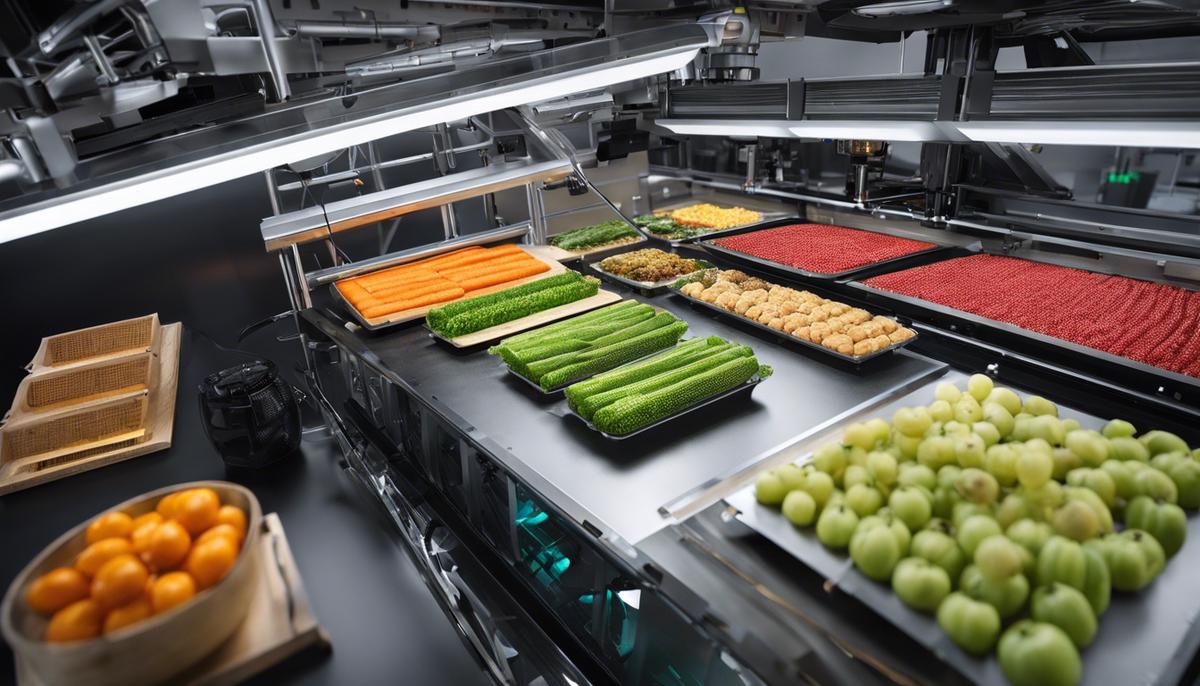
Sustainability in the Food Industry
A Greener Plate: Sustainability Trends Impacting the Food Industry in 2023
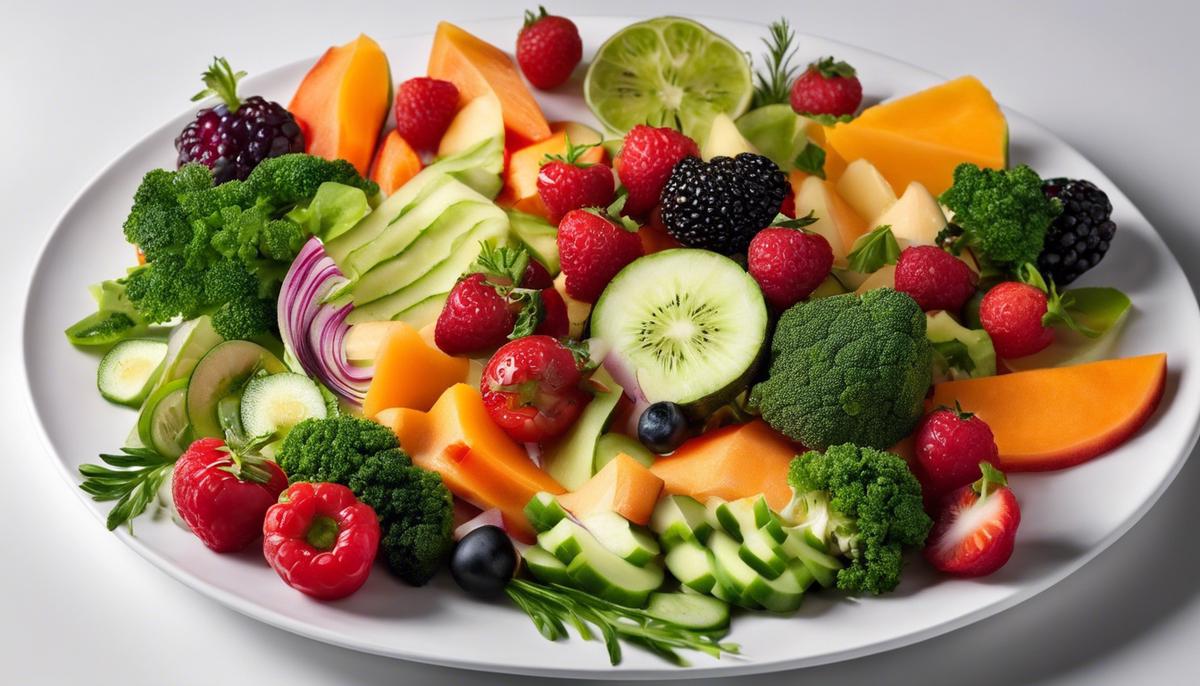
Consumer Behavioural Shifts | Food industry
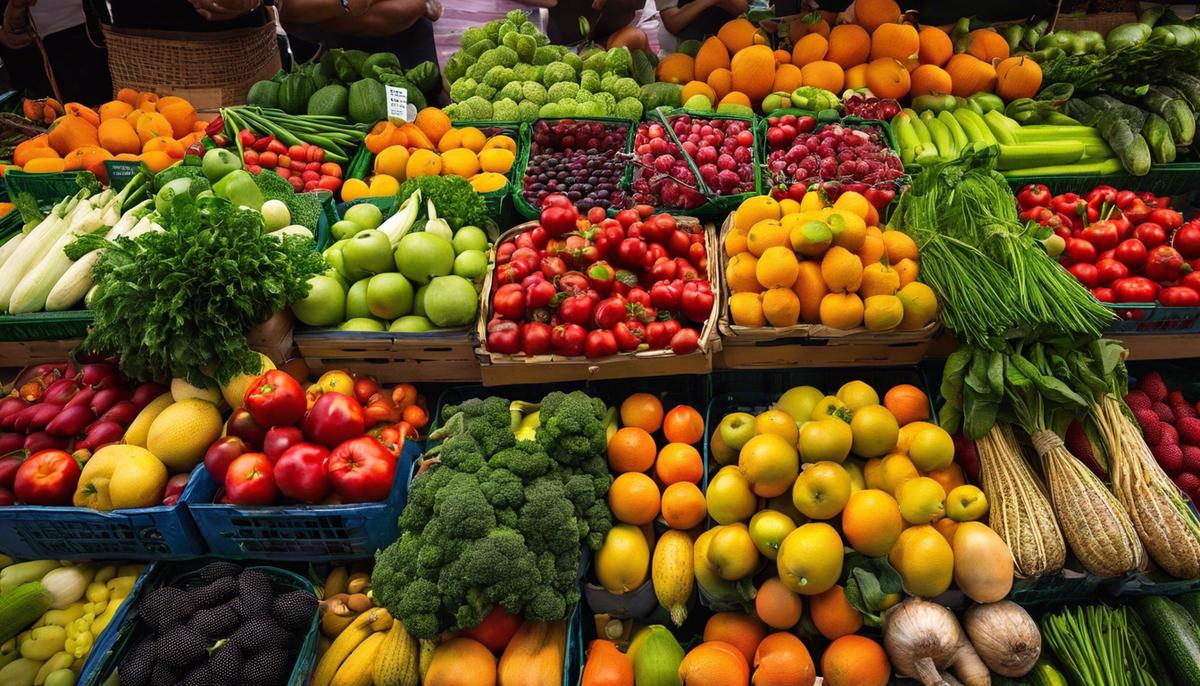
Industry Regulation and Policy changes
Shaping the Future: Key Policy and Regulatory Shifts Coming to the Food Industry in 2023

What is the future of food industry?
Advancements in Food Technology
Digesting Change: Technology's Influence on the Food Industry

Sustainability and Ethical Sourcing
The Future of Food: The Indispensable Intersection of Sustainability and Innovation
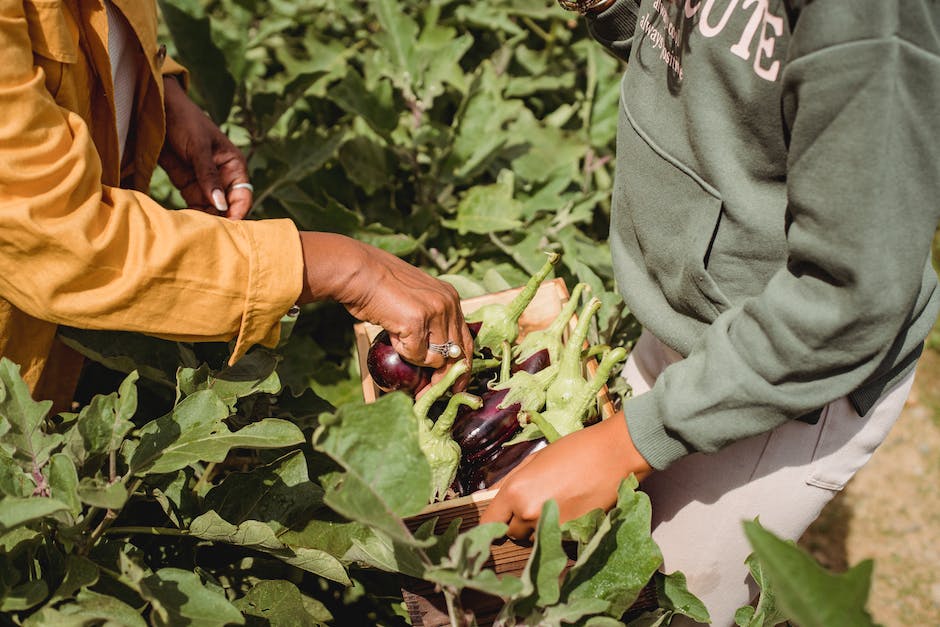
Health-Focused Food Innovations
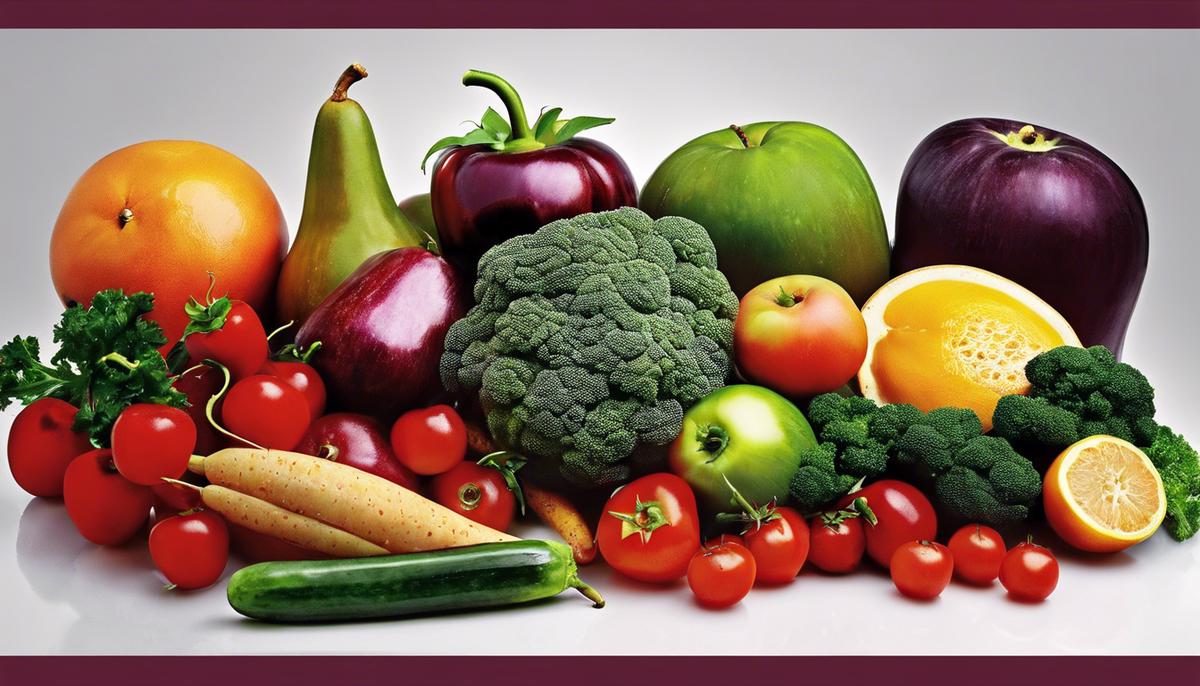
Impact of Global Trade Policies

Food Experience and Consumer Trends
The new-age consumers are not just picking a product off the shelf; they are exercising their choice with a detailed understanding of what goes into their food, where it comes from, and how it impacts the environment. This knowledge-driven decision-making process is altering the fabric of the food industry and shifting its future towards a more sustainable, health-conscious, and transparent realm.
